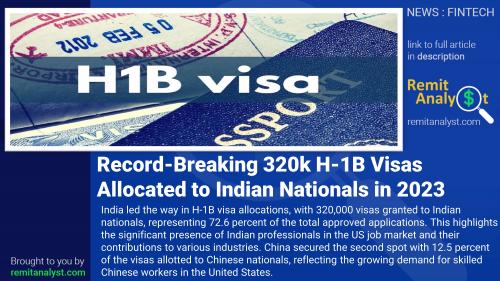Record-Breaking 320k H-1B Visas Allocated to Indian Nationals in 2023

Key Points:
- USCIS approved a total of 441,000 H-1B visa applications last year.
- Indian nationals received 72.6% (320,000 visas) of the approved applications.
- China ranked second with 12.5% of the allocated visas.
- Canada secured the third position with 1% of approved visas.
- H-1B visa allows US employers to hire foreign workers in various fields.
- Annual cap of 85,000 visas sparks discussions about raising the limit.
- There was an 8.6% increase in approved H-1B visa requests compared to the previous year.
- Congressman Shri Thanedar advocates for increasing the H-1B visa cap.
- H-1B program plays a crucial role in accessing global talent and filling specialized positions.
- Discussions on immigration policies and visa allocations shape employment opportunities for skilled foreign workers in the US.
Summary:
The United States Citizenship and Immigration Services (USCIS) approved a total of 441,000 H-1B visa applications last year, with Indian nationals receiving the majority of allocations. Among the approved applications, 72.6 percent, or 320,000 visas, were granted to Indian nationals, while China ranked second with 12.5 percent of the visas allocated. Canada secured the third position with one percent of approved visas. The H-1B visa allows employers in the US to hire foreign workers in various fields. The annual cap of 85,000 visas has sparked discussions about raising the limit to facilitate more legal pathways for immigration.
In-Depth take by RemitAnalyst:
India led the way in H-1B visa allocations, with 320,000 visas granted to Indian nationals, representing 72.6 percent of the total approved applications. This highlights the significant presence of Indian professionals in the US job market and their contributions to various industries. China secured the second spot with 12.5 percent of the visas allotted to Chinese nationals, reflecting the growing demand for skilled Chinese workers in the United States. Canada ranked third, receiving one percent of approved visas, indicating a smaller but still notable portion of Canadian professionals seeking employment opportunities in the US.
The H-1B visa program plays a crucial role in allowing US employers to hire foreign workers who possess specialized skills and expertise. This includes professionals in fields such as architecture, IT, accounting, medicine, and more. The program provides an avenue for companies to access global talent and fill positions that require specific qualifications. The six-year maximum duration of H-1B visas, along with the option for extensions, allows employers to retain valuable employees and ensure continuity in their workforce.
Last year saw an 8.6 percent increase in approved H-1B visa requests compared to the previous year, demonstrating the growing demand for skilled foreign workers in the US job market. The rise in approvals reflects both the continuous need for specialized expertise and the recognition of the contributions made by these professionals to the US economy. In particular, 3.01 lakh Indians, or 74.1 percent of the approved visas, benefited from the H-1B program in 2021, underscoring the significant presence of Indian professionals in various sectors.
However, the annual cap of 85,000 H-1B visas poses challenges for US employers seeking international talent. The limited number of visas available each year creates a competitive environment, with more applicants than available spots. This scenario can be particularly challenging for companies looking to fill positions requiring specialized skills that may not be readily available in the domestic labor market. As a result, discussions about raising the H-1B visa cap are ongoing, aiming to address the demand for skilled foreign workers and ensure US employers have access to the talent they need.
Congressman Shri Thanedar has emerged as a prominent advocate for increasing the H-1B visa cap. During a recent Congressional hearing on the FY 2024 Budget for the US Department of Homeland Security, Thanedar emphasized the importance of expanding legal pathways for immigration. By raising the H-1B visa cap, he believes the United States can attract more international talent, meet the needs of US employers, and foster economic growth. These discussions reflect the ongoing efforts to strike a balance between protecting domestic job opportunities and leveraging the benefits of a diverse and skilled workforce.
As the dialogue around immigration policies and visa allocations continues, the allocation of H-1B visas remains a significant factor in facilitating employment opportunities for skilled foreign workers in the United States. The considerations surrounding the visa cap underscore the importance of aligning the job market's demands with the goal of attracting top talent from around the world. The outcome of these discussions will shape the future landscape for foreign workers seeking employment in the United States and the industries that rely on their expertise.
Advertise on APSense
This advertising space is available.
Post Your Ad Here
Post Your Ad Here
Comments